How being bad at DIY inspired a successful start-up
- Published
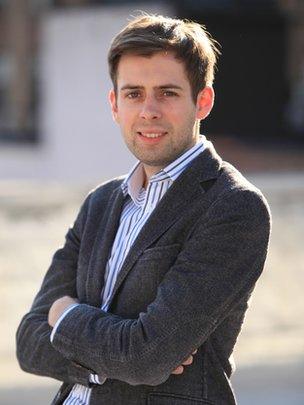
An inability to do DIY work, and a dislike of household cleaning, looks set to make one young Irish entrepreneur a multimillionaire.
The man in question is 31-year-old Oisin Hanrahan, the boss and co-founder of fast-growing New York-based business Handy.
Via its website and mobile app, Handy allows members of the public to easily book pre-vetted cleaners or handymen and women.
If you need a plumber, or even just someone to assemble some flat-pack furniture for you, all you need to do is fill in an electronic form, describing what needs doing, when you want it done, and where you live.
Handy will then quote you a price, and you pay there and then.
Then at the time you want the job done, a Handy registered and approved tradesman or woman will arrive at your home.
Set up in 2012, Mr Hanrahan and his co-founder Umang Dua, 28, came up with the idea when they were flatmates in Boston.
Both were studying at Harvard Business School, and they were struggling to find someone they could trust to clean their messy student apartment, or do any repair work.
Handy is today available in 25 cities in the US, and two in Canada. And last year it launched in the UK, in London, Manchester, Birmingham, Bristol and Brighton.
Now turning over $108m (£71m) a year, Handy is being used by hundreds of thousands of customers, and has more than 5,000 service professionals on its books.
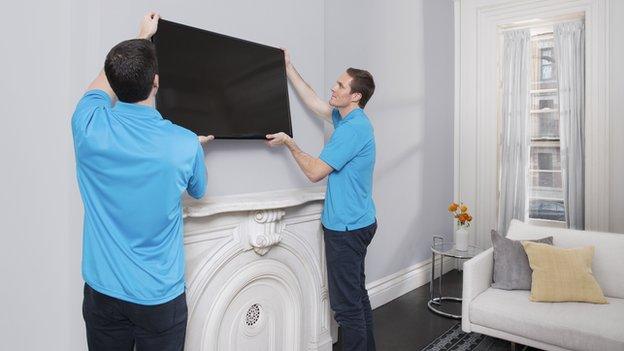
More than 5,000 tradesmen, women and cleaners are now registered with Handy
Its rapid expansion has been made possible thanks to $45m of venture capital investment, and a deliberate policy of becoming the biggest such provider as quickly as possible, so as to see off any rivals offering a similar service.
Other competitors, such as UK business Mopp, have been bought up.
"How do you make sure that customers love the platform? It is really about the availability [of the cleaners and handymen]," says Mr Hanrahan.
"You have to become the biggest, as this gives you the most service professionals."
Hungarian investment
Born and bred in Dublin, Mr Hanrahan opened his first business while studying economics at the city's prestigious Trinity University.
Using money he had saved by working for a year between school and university, he decided to launch his own property development company.

Mr Hanrahan first cut his business teeth investing in property in Hungary
The Irish housing market was booming at the time, but Mr Hanrahan realised that he could make bigger profits if he looked abroad.
So instead of buying apartments in Dublin, Cork or Limerick, he starting purchasing them in Budapest, the capital of Hungary.
Mr Hanrahan would then get the properties redeveloped, before selling them on at a significantly higher price.
This meant that while his student friends were enjoying the nightlife of Dublin every weekend, he was often flying to Budapest.
"My university friends thought it was madness... but by the end in Budapest I was employing 35 to 40 people."
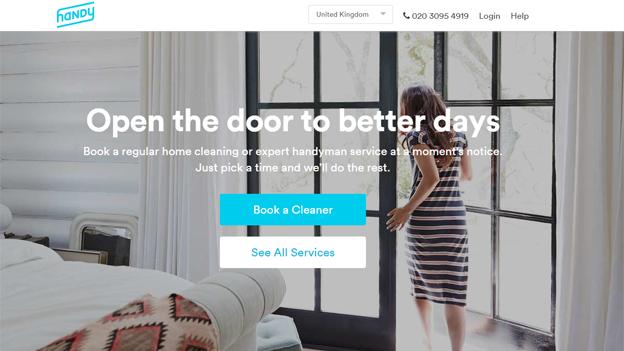
Handy now operates in three countries - the US, Canada and the UK
However, in 2008 Mr Hanrahan sold his Hungarian property business, as the impact of the global financial crisis meant he could no longer get the cheap loans that had fuelled its growth.
Instead, after graduating from Trinity he did a masters in finance and private equity at the London School of Economics. Following a short period working for a venture capital firm in the City of London, he was accepted by Harvard Business School to do its celebrated MBA (master of business administration) course.
After one year, Mr Hanrahan and Mr Dua, who comes from India and holds the chief operating officer title, dropped out to set up Handy in the summer of 2012.
Mr Hanrahan says he knew that speed was of the essence: "Every entrepreneur always feels a sense of urgency whether real or in his own head.
"And for us, it did feel like a moment in time, the time when people were increasingly moving away from buying [household] services in an old-fashioned way, to buying them via the internet or mobile."
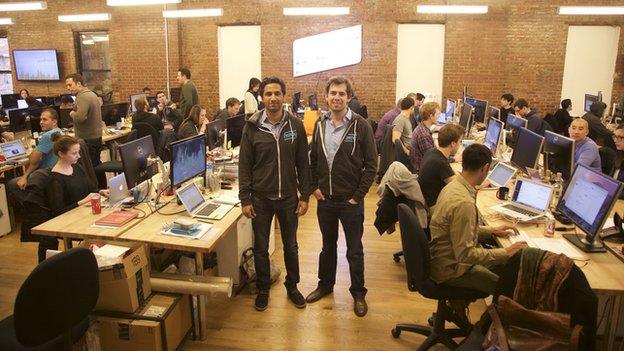
The business moved its head office from Boston to New York early on in its development
Realising they had to be quick, so as to beat other start-ups with the same sort of business model, they aimed to get to market as soon as possible.
Within weeks they had secured $50,000 of funding from a venture capital firm impressed by the idea, and a further $2m followed in September 2012.
Initially based in Boston, they soon moved their headquarters to New York, as Mr Hanrahan felt it was important to be based in the US's largest city and marketplace.
After some targeted advertising, the first few hundred tradesmen and women signed up, and customers soon followed in ever increasing numbers.
A roll-out to other US and Canadian cities then followed as the months progressed, as did further rounds of funding.
Feedback system
Now with more than 200 technical and administrative staff on its books, Handy pre-checks each and every cleaner, tradesman and woman that signs up.
Each has to first complete an online application form, before a telephone interview, and then an interview in person. Handy also does a background check to ensure they don't have any criminal records.
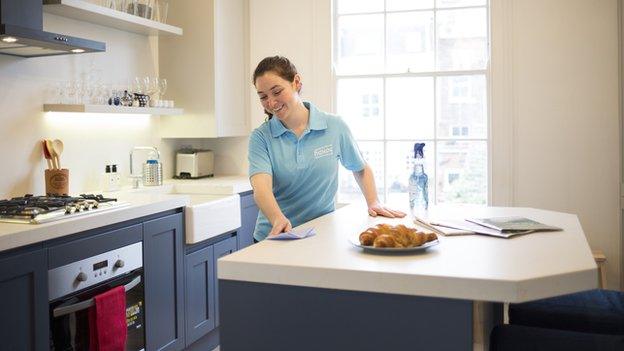
Customers can score Handy tradesmen and women out of 10 for the quality of their work
The service professionals can then pick jobs from Handy's website, on a first come, first served basis, with Handy taking a 20% cut of the money.
After a job has been done, the customer is asked to give feedback to Handy, and to give the trade professional a score out of 10. Any who receive consistently low scores are removed from the service.
At the same time, the professionals can report any customers who are rude or abusive.
While Handy's model is easy to copy, Mr Hanrahan says the sky is the limit for the business, as it conveniently meets the needs of millions of people - how to find a decent, trustworthy tradesman.
He says: "We are working on an idea which has a trillion dollar marketplace, and that is a very rare thing."